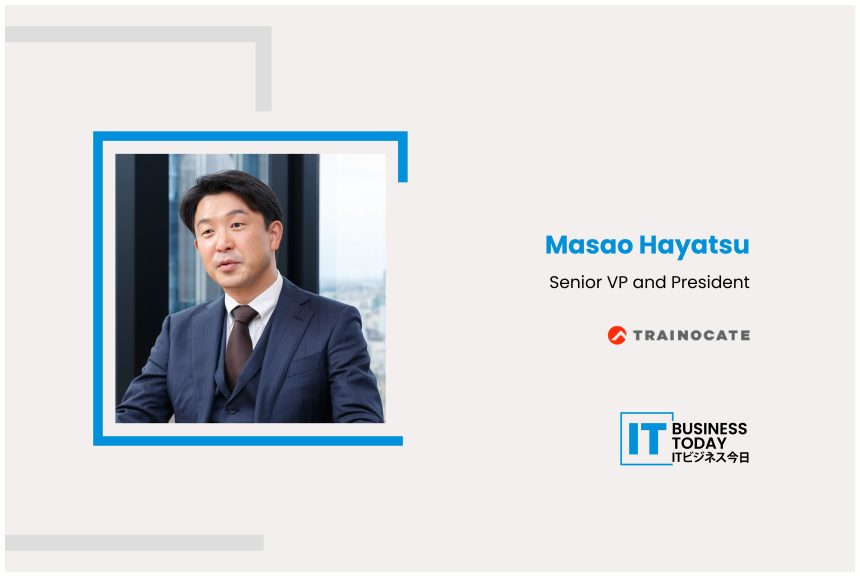早津さんのご経歴と、トレインノケート・ジャパン株式会社での現在のお仕事についてお聞かせください。
大学卒業後、伊藤忠テクノソリューションズ株式会社に営業として入社し、数多くの企業のIT導入に携わりました。その後、外資系ITベンダーで経験を積んだ後、2010年にトレノケート・ジャパン株式会社(当時はグローバルナレッジネットワーク株式会社)に入社しました。(外資系ITベンダーで経験を積んだ後、2010年にTrainocate Japan株式会社(当時の社名は株式会社グローバルナレッジネットワーク)に入社しました。その後も営業職としてキャリアを積み、2022年に代表取締役社長に就任し、現在に至ります。
トレノケート・ジャパン株式会社は、同業他社のトレーニング・開発プロバイダーとどのように差別化されていますか?
トレノケート・ジャパンの強みは、グローバルITベンダーとの強固なパートナーシップ、企業のニーズに合わせたカスタマイズ可能なトレーニングプログラム、専任の常勤講師陣です。IT企業の子会社であることが多い日本の他のITトレーニング会社とは異なり、トレインノケート・ジャパンは完全に独立した企業として運営されており、中立的で偏りのない人材育成ソリューションを提供しています。また、様々な国にグループ会社があるため、最新のITトレンドに触れることができ、グローバルに事業を展開する企業へのサポートも容易です。
トレノケート・ジャパンのリーダーとして、日本市場での足跡を強化するための戦略的最優先課題は何ですか?
当社は長年にわたり、情報通信業界のお客様からのご依頼を中心にIT人材・エンジニアを育成してまいりました。近年では、これらの業界からのニーズが高まる一方で、金融、小売、製造など、より幅広い業界からの引き合いも増えています。
業種や企業によってニーズは異なりますが、これまでの実績を活かし、マイクロソフトやAWSといった大手ITベンダーとの連携をさらに強化することで、お客様一人ひとりの期待に応えていきます。
日本独特の企業文化や労働力のダイナミクスを踏まえ、Trainocateのグローバルなビジョンを日本の企業やプロフェッショナルの具体的なニーズに合わせてどのように調整されていますか?
人生100年時代」の考え方が浸透しつつある日本では、定年が延長され、多くのビジネスパーソンが長期的なキャリアプランの見直しを迫られています。企業においても、少子高齢化による労働力不足への対応が求められています。他国同様、デジタルトランスフォーメーションへの対応も不可欠です。
Trainocateは、ITエンジニアのトレーニングだけでなく、企業全体の人材育成もサポートします。各企業の課題や戦略に沿った柔軟なトレーニングプログラムを設計し、ITエンジニア以外のビジネスプロフェッショナルも含め、デジタルトランスフォーメーションを推進できる人材の育成を可能にします。
Trainocateは、2024年だけでも179,000人以上の個人と組織をトレーニングしてきました。このような生涯学習に対する需要の高まりの背景には何があり、Trainocateはどのように進化しているのでしょうか?
その最大の要因のひとつが、デジタル技術の急速な進化です。これにより、企業の競争力維持に対する危機感が高まり、個人の生涯学習に対するニーズも高まっています。学習者のニーズは多様化しており、Trainocateはオンライン、対面式、eラーニングなど様々な学習形式を提供し、スキル評価や実習ラボなどの付加サービスを提供することで、これらのニーズに対応しています。
AI、クラウドコンピューティング、サイバーセキュリティの台頭により、技術スキルの状況は一変しました。今、日本で最も注目を集めている技術トレーニングはどの分野でしょうか?
AI、クラウドコンピューティング、サイバーセキュリティのスキルは、諸外国と同様、日本でも特に高い需要があります。また、データ分析やDevOpsに関する研修も注目を集めています。また、企業のデジタルトランスフォーメーション(DX)が進む中、ITユーザー向けのITやデータ活用に関する研修の問い合わせも多く寄せられています。
デジタル化が進む経済の中で、日本企業がグローバルな競争力を維持するために、スキルアップとリスキルが果たす役割をどのようにお考えですか?
リスキルやスキルアップは、日本企業にとってだけでなく、日本という国の競争力を維持・向上させるためにも不可欠なものだと思います。近年、日本が世界ランキングで IMD デジタル競争力ランキングは下落の一途をたどっています。特に、最新の2025年ランキングでは、「人材」のカテゴリーに含まれる「デジタル/テクノロジースキル」において、日本は最下位となりました。一方で、このことは、デジタル・スキルの向上が競争力強化に大きく貢献することを示唆しています。
多くの企業は、トレーニングのROIを測定するのに苦労しています。Trainocateは、学習プログラムを測定可能なビジネス成果に適合させるために、企業のお客様をどのように支援しているのでしょうか?
これは非常に難しい課題です。最終的には、評価を各社員やチームのパフォーマンス向上につなげていくことが望ましいのですが、現状では、アセスメントの点数や実習の修了度など、研修前後の理解度の向上を測ることで指標の1つにしています。
Trainocate社は、このような急速に発展する業界において、グローバルな技術ベンダーや認証機関とのパートナーシップをどのように活用しているのでしょうか?
認定トレーニングの提供だけでなく、イベントへの参加やセミナーの開催など、テクノロジー、製品活用、スキル開発に関する啓蒙活動でベンダーと頻繁に協力しています。さらに、AWS、マイクロソフト、シスコなどの主要ベンダーとの協力に加え、Trainocateは日本市場独自のベンダー認定トレーニングも提供しています。
今後3~5年間、日本のトレーニングや資格取得の現場で予想される最大の課題は何でしょうか。
学習者の多様化、学びのデジタル化、そしてジェネレーティブAIの台頭。これらの変化は、単にスキルのあるプロフェッショナルを増やすのではなく、既存の人材をいかに迅速にスキルアップさせるかが、企業の競争力にとって重要な課題となることを意味しています。
このような背景から、IT初心者や他分野からの転職者の育成、そして上級プロフェッショナルのさらなる成長を支援する必要性が高まっています。特に新入社員のオンボーディングでは、一人ひとりのスキルレベルに合わせた個別学習環境の提供が不可欠です。
当社は、インストラクターによるトレーニングとeラーニング、学習管理システム(LMS)、実習ラボを組み合わせたソリューションを提供し、個別最適化と即実践のバランスを図っています。
さらに、人材育成における新たな喫緊の課題は、"ジェネレーティブAIとともに働く能力の構築 "です。ジェネレーティブAIは、単なる業務効率化のためのツールを超え、価値創造のための中心的なテクノロジーとして台頭しつつあります。今後は、すべてのプロフェッショナルが、それぞれの役割においてAIを理解し、使いこなすことが求められるでしょう。当社では、この分野における研修のラインナップを積極的に拡充しています。
最後に、トレインノケート・ジャパンの個人的なビジョンと、今後数年間でどのようにレガシーを形成していきたいとお考えですか?
私たちは、"世界を変える人を育てる "をビジョンに掲げ、IT人材の育成を通じて企業や社会の変革を支援する組織を目指しています。テクノロジーが進化し、社会構造が加速度的に変化する中、継続的な学習と成長の重要性はますます高まると考えています。
私たちは、全従業員が自らの貢献に誇りを持てるような職場の育成に努め、クライアントの変革をサポートし、共に未来を切り開く信頼できるパートナーとしての地位を確立していきます。
日本では、「ITトレーニングといえばトレノケート」と広く認知され、短期的な成果だけでなく、持続可能で長期的な価値を提供できる組織を構築することが目標です。
早津さん、ありがとうございました!








